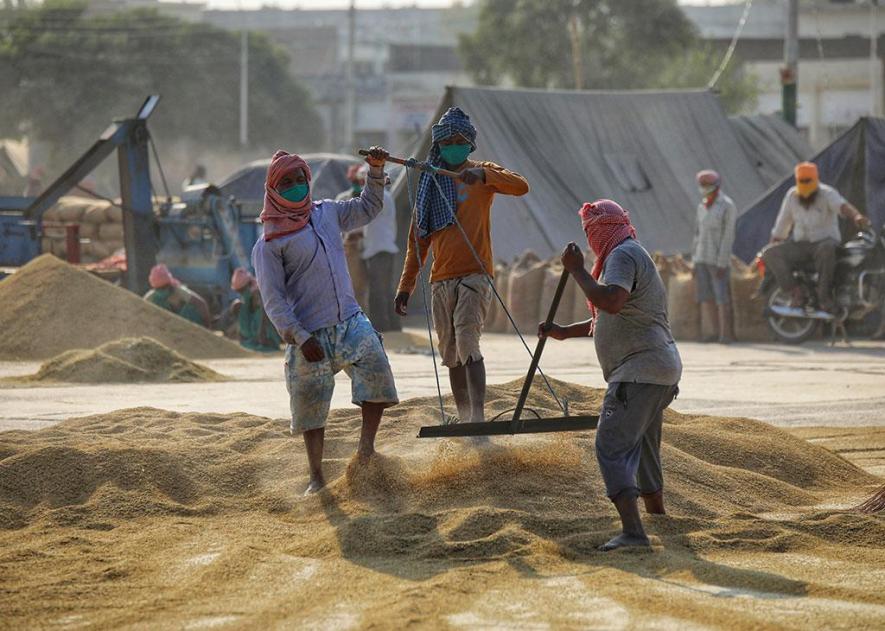‘We Aren’t Middlemen, Govt Using Farm Laws to Erase Us’: Punjab’s Arthiyas

Represntational image. | Image Courtesy: Down to Earth
As protests across India against the three farm laws continue with greater fervour, a major section of the agricultural economy -- the Arthiyas or commissioning agents are left in a flux. The fear of Agricultural Produce Market Committees (APMCs) being sidelined and losing autonomy with the introduction of private players in the business has left a big question mark on the livelihoods of both Arthiyas and mandi workers.
As the Narendra Modi-led central government claims that the new laws will facilitate direct benefit to farmers by removing commissioning agents from the picture, this week, it has asked the Punjab and Haryana governments to ensure online payment for crops procured at minimum support price (MSP) directly to farmers from next procurement season. While this has been seen as a strike on Arthiyas, the Centre has said this is to ensure that farmers get full benefit of the price offered by the government. Meanwhile, going a step further, Uttar Pradesh has implemented a biometric authentication system for farmers to ensure the provision of MSP. However, both farmer unions and Arthiyas associations have been protesting the move of the Centre, terming it dubious in nature.
Speaking to NewsClick, Bittu, a jobber or aadhti from Rampura Phul district Bathinda said, "The government refer to us as middlemen; firstly, I want to make it clear that we are not middlemen, but service providers to the government." When asked how, Bittu said, "We transport the farmer's crop, store it, keep it safe and provide it to the government when required. We are not 'dalaals', we don't crook farmers."
Bittu said the government wants to remove them from the picture and give this work to the private bodies. He said, "The farmers trust us that they can come to us in any emergency. If a farmer needs money urgently, he/she knows they can come to us. If these laws are passed and we are removed from the picture, can the farmer go to the government, or the private players?"
There are around 28,000 registered arthiyas in Punjab alone, who are handling the crops of the around 11 lakh farm households, which includes procurement of around 36 million tonnes crops. Arthiyas state that they play a crucial role in the agricultural system; when the farmers bring their produce to the APMCs, the commissioning agents, who are given 2-2.5% commission for the provision of their services, help the farmers store the crop, clean it, load and unload it and often provide them with pesticides, insecticides and fertilisers making them indispensible in the chain of deep networks with suppliers.
Speaking to NewsClick, Ravinder Singh Cheema, president of the Arhtiya Association Punjab, said, “We have bought shops from the government. The Centre wants to collapse the mandi system; when a consumer can buy products from outside for a lot cheaper (without taxes), then no one will come to the mandi, and it will lead to the collapse of our system. The government wants to victimise the arthiyas and remove them. But we want the government to understand that the model of Punjab, where one gets the MSP prices more or less, has to do with the regulatory role of the arthiyas. Even if one gets 40 lakh in commission, we still make a lot less, given the nature of the duty. There are states which have middlemen, like in Uttar Pradesh and Gujarat, but it prevails where there is no regulated system.”
Arthiyas claim that the online transaction proposed by the Centre is a way of creating an impression that the removal of arthiyas will benefit the system. Stating that e-mode of MSP payment is already in force across India, the arthiyas associations claim that the move is to deviate the narrative from the protest and ensure the erasure of arthiyas.
Speaking to NewsClick, advocate and farmer, Amarveer Bhullar said, “We take our crops to the arthiyas, they provide us with services. the arthiya are not middlemen, it's not like they take some crop for Rs 1 and sell it off for Rs 2. The private players want us to buy everything from them, ensuring their total monopoly. For the past 10 years, we have been providing seeds to many companies, so this is not true that we can't sell privately. These things were already there, but arthiyas form a deeper system in providing insecticides, fertiliser and so much more, so this narrative of creating an ease is being created to benefit corporates.”
Commenting on the narrative of the Modi government, Darshan Pal Singh of the Samyukt Kisan Morcha said, “The hatred towards arthiyas is associated with their role as moneylenders. However, it needs to be understood that their role is of service providers; a long standing demand of the farmers protest has also been to bring in transparency in this process. But the government just wants to chuck them out of the equation to save their 2.5% commission. Arthiyas as arthiyas are fine, but their role as moneylenders needs to be regulated.”
The associations state that instead of having the political will to create transparency and accountability, the government has resorted to targeting the arthiyas and defaming them.
Previously, houses of several leaders of arthiya associations were raided, IT notices were served to 14 arhtiyas and raids were conducted at the premises of seven of them across Punjab--most of these people are office bearers of arhtiya associations at state and district levels.
Also Read: Farmer Protests: Busting the Myth of Modi’s Omniscience
Get the latest reports & analysis with people's perspective on Protests, movements & deep analytical videos, discussions of the current affairs in your Telegram app. Subscribe to NewsClick's Telegram channel & get Real-Time updates on stories, as they get published on our website.
























